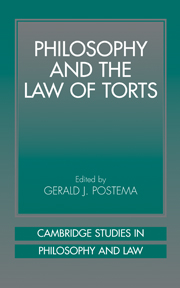Book contents
- Frontmatter
- Contents
- Contributors
- 1 Introduction: Search for an Explanatory Theory of Torts
- 2 A Social Contract Conception of the Tort Law of Accidents
- 3 Responsibility for Outcomes, Risk, and the Law of Torts
- 4 The Significance of Doing and Suffering
- 5 Tort Law and Tort Theory: Preliminary Reflections on Method
- 6 Corrective Justice in an Age of Mass Torts
- 7 Economics, Moral Philosophy, and the Positive Analysis of Tort Law
- 8 Pluralism in Tort and Accident Law: Towards a Reasonable Accommodation
- References
- Index
7 - Economics, Moral Philosophy, and the Positive Analysis of Tort Law
Published online by Cambridge University Press: 01 July 2009
- Frontmatter
- Contents
- Contributors
- 1 Introduction: Search for an Explanatory Theory of Torts
- 2 A Social Contract Conception of the Tort Law of Accidents
- 3 Responsibility for Outcomes, Risk, and the Law of Torts
- 4 The Significance of Doing and Suffering
- 5 Tort Law and Tort Theory: Preliminary Reflections on Method
- 6 Corrective Justice in an Age of Mass Torts
- 7 Economics, Moral Philosophy, and the Positive Analysis of Tort Law
- 8 Pluralism in Tort and Accident Law: Towards a Reasonable Accommodation
- References
- Index
Summary
The positive analysis of tort law is descriptive in the sense that it ascribes a purpose to tort liability, such as one based on corrective justice or wealth maximization, and then interprets tort law in those terms. An interpretation that adequately describes tort practice is thought to support the claim that the tort system serves the purpose upon which the interpretation is based, even if participants in the system do not consciously pursue that purpose.
This analytical approach is partially motivated by the role that precedent plays in the justification of legal decisions. If positive analysis shows that most of tort law maximizes wealth, for example, then one may have substantial precedent for justifying the wealth-maximizing outcome in the case at hand. Similarly, a greater ability to discern commonality in prior cases makes one more capable of predicting the outcome of future cases, insofar as “like” cases are supposed to be treated alike.
By enhancing the ability of the tort system to handle cases in a uniform and consistent manner, positive analysis promotes or protects the values of equality and reliance. Positive analysis has only limited normative value, however. Even if positive analysis shows that most of tort practice can be adequately described as serving some purpose, a purpose that is not morally justified probably does not provide a good reason for deciding the present case (Alexander 1989). Any purpose ascribed to tort law must be normatively justified, so the positive analysis of tort law cannot substitute for normative theory.
- Type
- Chapter
- Information
- Philosophy and the Law of Torts , pp. 250 - 275Publisher: Cambridge University PressPrint publication year: 2001
- 3
- Cited by

